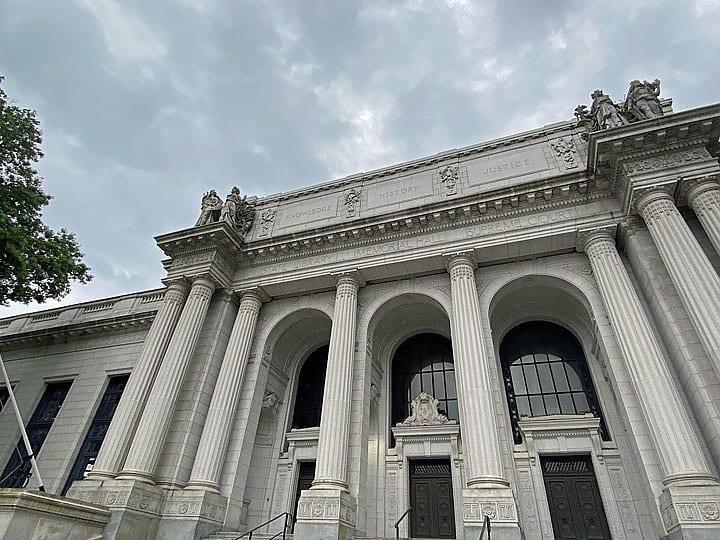Bar Exam Required – Remotely This Year

Audio By Carbonatix

Connecticut Supreme Court. Photo credit: Christine Stuart, CTNewsJunkie.com (file photo)
In an average year, 20-25% of those taking the Connecticut bar exam for the first time fail, and if granted emergency diploma privilege rather than being required to pass, many could be allowed to practice law without proving competency.
By Karena Garrity, CTNewsJunkie.com
After deliberation, Supreme Court Chief Justice Richard A. Robinson announced that Connecticut will not allow law students admission to the state bar before passing the bar exam, which will be administered online in October.
The news, announced in a letter dated Aug. 31, comes as a disappointment to Wyatt Bosworth, a 2020 University of Connecticut Law School graduate. He and a group of seven other recent law school graduates spent weeks petitioning for Connecticut to adopt the emergency diploma privilege licensure model, which would allow individuals admission to the bar upon successful completion of law school requirements and graduation.
Under the proposed emergency diploma privilege, applicants would be required to meet all other requirements for admission to the bar, such as passage of the Multistate Professional Responsibility Examination and a positive moral character and fitness determination. The graduates would be bound by Connecticut’s rules for professional conduct and the need to keep up with continuing education standards. However, due to the extenuating circumstances caused by the pandemic, the graduates would forgo the actual two-day bar examination.
The overarching argument for granting emergency diploma privilege presented by the graduates is the possibility of technical difficulties on test day, access to reliable exam infrastructure, including appropriate laptops and computers, speedy and consistent internet availability and the inability to take the exam in an area free of all distractions.
However, during a meeting last month via Microsoft Teams and streamed live on YouTube, Kathie Harrington, deputy director of attorney services with Legal Services and the Connecticut Bar Examining Committee voiced concern that not administering the test could allow a number of people who would most likely not pass the test, to practice law immediately. This could weaken confidence in the legal system and prohibit protection for the public, she said.
Harrington pointed out that statistically, 20-25% of first-time exam takers fail the bar in Connecticut, which would equate to somewhere between 80 and 100 of those currently signed up to take the exam failing to achieve the minimum competency score to practice law in the state.
She went on to explain that of first-time takers of the 2019 bar exam, 59 failed. Of that 59, 46 failed by more than 20 points and more importantly, of that 46, 18 failed by more than 30 points.
“If diploma privilege is given, and these individuals pass the other recommendations, then they would be allowed to practice law,” said Harrington. “The bar is a minimum competency score.”
To date, four states have adopted the diploma privilege model: Utah, Oregon, Washington, and Louisiana.
Chief Justice Robinson wrote in his letter, “I have completed my review of the materials including various letters, e-mails and petitions, as well as the meeting between various stakeholders and the Rules Committee and I have come to the difficult decision to not seek a rule change at this time.”
His decision means that the Connecticut bar exam will be administered online as a remote exam on Oct. 5-6.
Under normal circumstances, the two-day exam is held in person in Connecticut, in July and February each year.
Bosworth, who is to start a job the Monday after the exam, is worried that something will go awry and his employer will not be able to push back his start date.
Throughout the proctored exam, those taking the test here simultaneously with others in 33 different states, will be asked to record and upload data files. It is this requirement that most concerns Bosworth and his group.
Bosworth pointed to Michigan, where a mass cyber-attack took place during the online test that is under review by the FBI. Bosworth explained that Florida was supposed to administer the exam two weeks ago, but has not done so because the mock test failed.
“There is no plan B if the test doesn’t work here in Connecticut,” said Bosworth.
After problems with the online exam in Nevada, its high court decided instead to do an open-book test by email, but Connecticut has yet to announce any back-up plan.
Bosworth said, “The graduates deserve to have a fair, reliable bar exam. We have all worked too hard for anything less to happen. The unreliable exam that is being given this year will unfortunately not measure competency, it will only measure an examinee’s financial resources, tech, and housing advantages.”
The remote examination will qualify applicants for admission to the bar in Connecticut. The examination will not result in a Uniform Bar Examination score, but the committee will seek reciprocity with other jurisdictions administering the remote examination. According to the National Conference of Bar Examiners (NCBE), Connecticut has entered into reciprocity agreements with the District of Columbia, Illinois, Kentucky, Maryland, Massachusetts, New Hampshire, New Jersey, New York, Ohio, Oregon, Tennessee, and Vermont for the portability of scores earned on the remote exam.
“We are definitely disappointed with the choice to not move forward with emergency diploma privilege. However, we are immensely proud that we got the Chief Justice of the Supreme Court to look into this extensively. And we are grateful for all the support we have received from the three deans of the Connecticut Law Schools – Yale, UConn, and Quinnipiac – as well as support from professors, practicing lawyers and other graduates,” said Bosworth.
Bosworth said the group of graduates he is collaborating with will be taking a break for now. In the future, he said they will ask whether the bar exam is an adequate test of competency.
Fifteen other states have denied petitions requesting emergency diploma privilege during the COVID-19 crisis: Alaska, California, Idaho, Illinois, Maryland, Minnesota, Missouri, Montana, Nebraska, Nevada, New York, North Carolina, Ohio, Pennsylvania, and Tennessee.
Republished with permission from CTNewsJunkie.com, all rights reserved.
Like what you see here? Click here to subscribe to We-Ha’s newsletter so you’ll always be in the know about what’s happening in West Hartford! Click the blue button below to become a supporter of We-Ha.com and our efforts to continue producing quality journalism.



